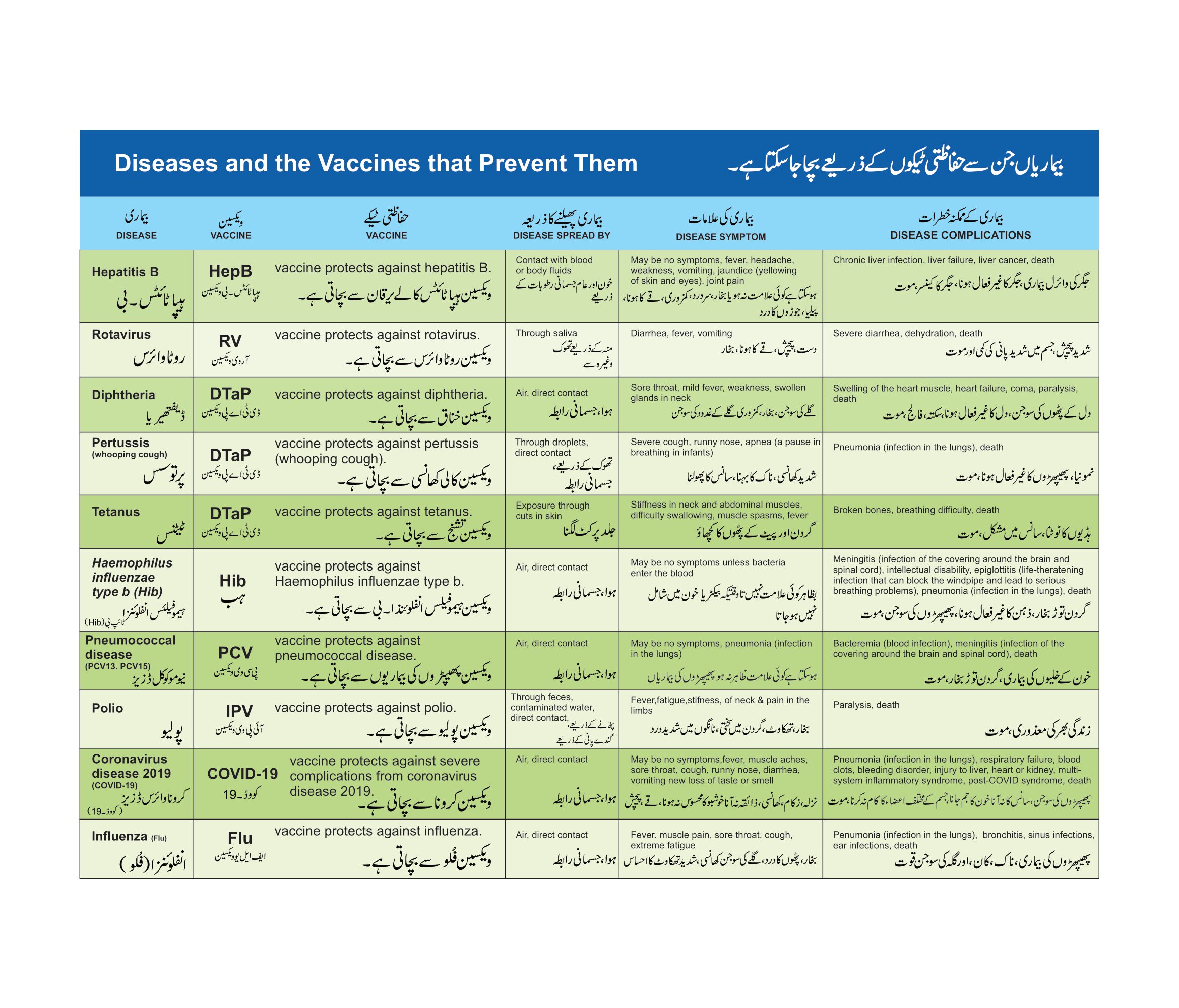
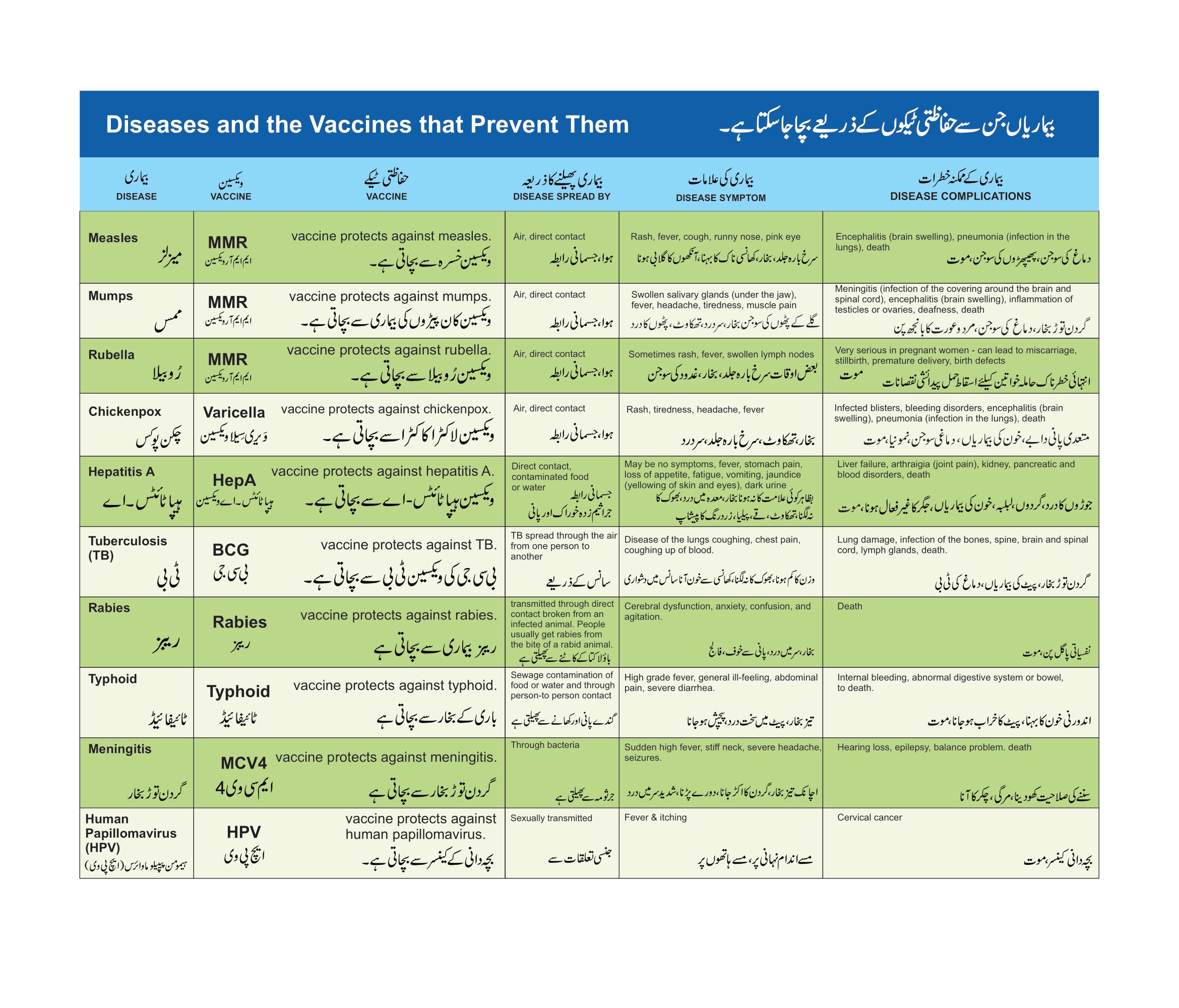
Diseases and their preventive vaccines
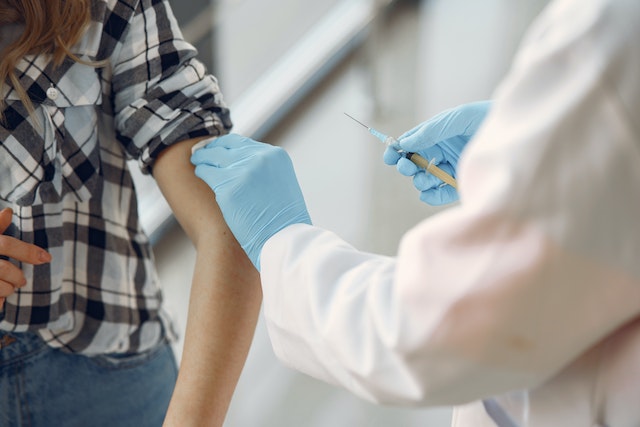
Rubella
Rubella is a name of German measles that lasts 3 days and shares some symptoms of measles, like a red rash. It is also a contagious disease; common symptoms are sore throat, fever, and rash. The rash will start from the face, then spread to the whole body. MMR vaccine helps kids stay safe from this disease, and they must get 2 shots between 12 to 15 months and 4-6 years of age.
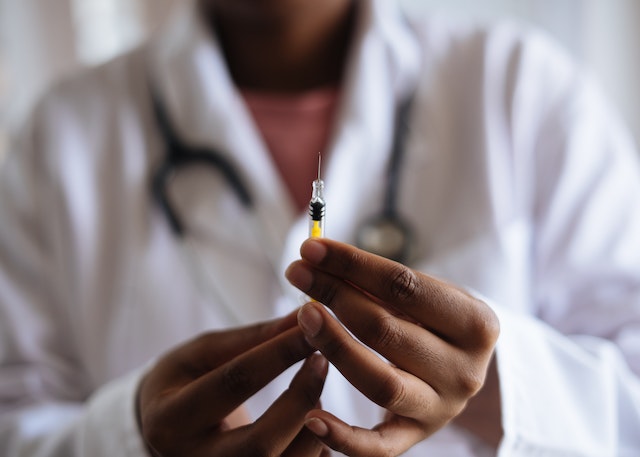
Mumps
An acute disease in children and young adults that causes their salivary glands to swell. Paramyxovirus is the cause of this contagious disease. People can get infected by airborne droplets from the upper respiratory tract or direct contact with the infected person. Every child must get 2 doses of the MMR vaccine. The symptoms of this disease are fever, headache, and swollen jaw.
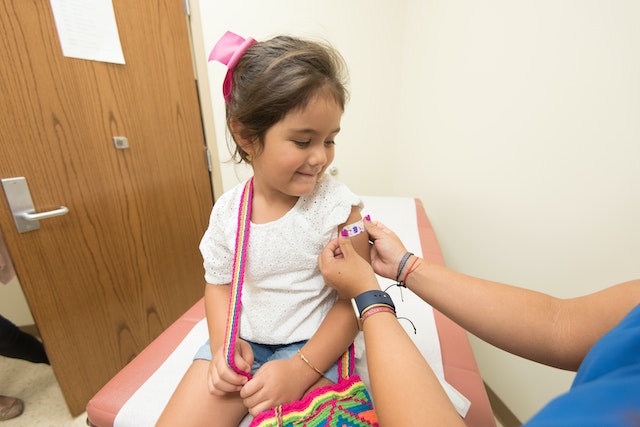
Measles
Measles virus infects the respiratory tract, then spreads throughout the body. In 2018, about 140,000 people got infected with this disease and died. Most of the deaths were among children under the age of 5. Between 2000-2018 there has been a drop in measles death worldwide. Every child should get their measles vaccine shot when they are 9 months old. The vaccine is the only way to keep kids safe from getting this severe disease.

Chickenpox
Varicella-zoster virus causes chickenpox also known varicella. It is a highly contagious disease. A person can get this disease with direct contact or through the airborne droplets of the infected person's respiratory secretions. Papules, blisters with fluid inside, crusts and scrabs are the symptoms of chickenpox. Children should get 2 doses of the vaccine at 12-15 months and 4-6 years. This disease can be fatal in some cases.

Hepatitis B
Hepatitis B is becoming a global health problem. This viral infection attacks the liver of the patient, which can further cause chronic disease. According to a WHO survey, approximately 296 million people were infected with this chronic disease in 2019, and every year, 1.5 million more people get infected with hepatitis B. Getting the hepatitis B vaccine at the right time is the only way to keep your children and yourself safe from getting infected with this life-threatening disease.
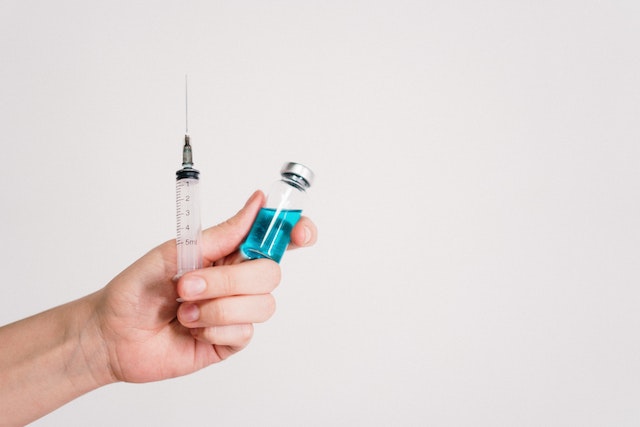
Pneumonia
Streptococcus pneumonia causes this disease, which is contagious whenever the infected person sneezes or coughs; others can also get infected. This disease affects the lungs and ears of the patient. A newborn gets a shot of the PCV vaccine that boosts immunity against this disease between the age of 6-8 weeks and then between 10-16 weeks of age. A booster shot at 12-15 months is also necessary.
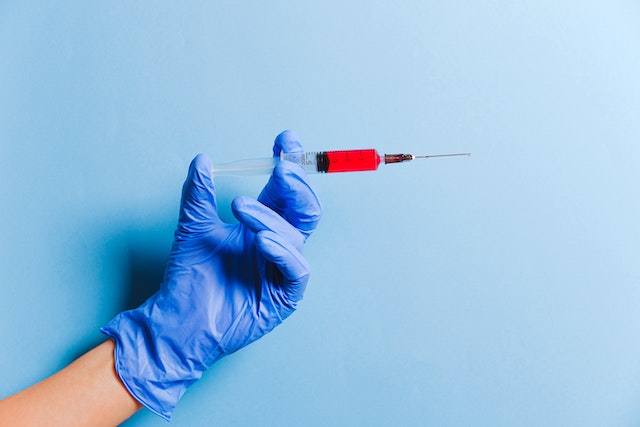
Diphtheria
Diphtheria is a serious infection caused by strains of bacteria called Corynebacterium diphtheria. According to WHO standards, a child must get 3 primary doses when they are infants because it improves their immunity, and then they should receive 3 boosters shots. A greyish membrane starts appearing on the throat of the person infected with diphtheria, and it becomes hard to breathe and swallow anything.
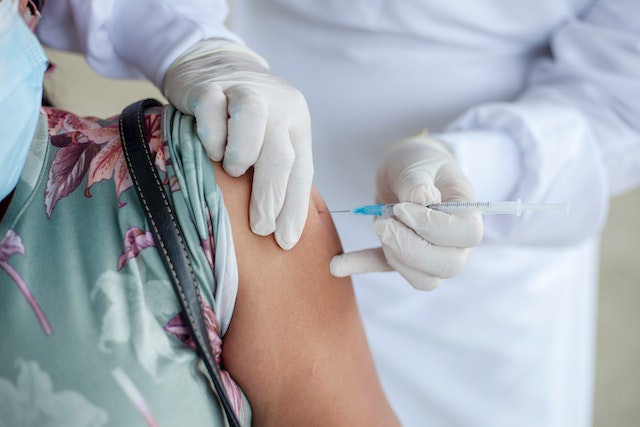
Tetanus
There is no age limit for getting tetanus illness. Yes, anyone of any age can get this disease through Clostridium tetani. You get infected with this bacteria through burns, deep cuts, or any wound that infects your nervous system. Newborns would be more vulnerable to getting this illness; therefore, they get a vaccine against this disease. Only by getting vaccinated can the immunity of a newborn or any other person fight this bacteria. In 2018, WHO estimated that approximately 25,000 newborns died from neonatal tetanus.

Hepatitis A
Hepatitis A is an inflammation of the liver that can cause mild to severe illness. According to a 2016 survey, approximately 7134 died from Hepatitis A. There is no such medication can treat hepatitis A. Only a person who gets the vaccine shot between the age of 19-59 years is safe. The early symptoms of hepatitis A are abdominal pain, dark circles under eyes, yellow eyes, pale skin, nausea, and fever.

HPV
In 2018, about 43 million people got infected with HPV infections. Most of the people were in their early 20s or late teens. HPV can cause genital warts; in some serious cases, it causes cervical cancer. Human papillomavirus (HPV) is the most common infection if we talk about the reproductive tract. Symptoms also included genital warts and painless growths. Every girl should get their first shot at age of 9 years and a second with gap of 6 months.

Bacilli Calmette-Guerin
Bacilli Calmette-Guerin is a vaccine that protects your infant from a life-threatening disease, tuberculosis known as TB. BCG vaccine is one of the most widely used vaccines worldwide, and in some countries, BCG is a part of the national childhood immunization program. Everyone should get this shot once in a lifetime to boost their immune system against TB. An infant should get the shot at birth, which protects the child for up to 15 years. In 2022 approximately 8,300 cases of TB were reported in the United States, and 7,874 in 2021.

Rotavirus
Children less than 5 years of age get infected with rotavirus, and its symptoms are dehydrating diarrhea. In developing countries, children get infected with this virus even before they turn 3. There are WHO-recommended vaccines that protect children from getting infected with this viral infection. The common symptoms are watery diarrhea, vomiting, abdominal cramps and fever.

HIB (Haemophilus Influenza Type B)
Hib can infect children under 5, but adults can also get it if they have serious medical conditions. The vaccine keeps the children safe from Haemophilus influenza. Some common symptoms are mild ear infections, fever, insomnia, or sleeping too much. A child gets a total of 4 shots of a combine vaccine against this disease and the vaccine will keep the kid safe from not only Hib but also from diphtheria, whooping cough, tetanus and polio.

Influenza
Influenza or flu is a contagious respiratory disease that direct infects nose. The lungs also can be get affected by this virus. The illness can get serious and leads to death sometimes. In 1918, 500 million people got infected by this disease, and approximately 20-50 million died. An infant, teen, adult and older person must get a shot to boost immunity against this disease.

Meningococcal
A deathly bacterial infection can cause two types of life-threatening illnesses. One is meningitis, in which the membranes get infected and cover the brain, and the other is septicemia, which poisons your blood. In 2022 532 confirmed cases of meningococcal disease were reported, and 124 people died out of it. Fever, fatigue, chills, cold hands and feet, diarrhea and rapid breathing are symptoms of this illness. Every child must get their vaccine between the age of 11 and 12 months with a booster shot at 16 months.

Rabies
One can get rabies if gets bitten by a rabid animal, most of the time by rabid dog. Rabies directly affects the body's central nervous system, the brain stops working, and ultimately, it ends up causing the death of the infected person. In Asia and Africa, rabies causes thousands of deaths, mostly under 15 years old. Globally rabies causes a cost of approximately US $8.6 billion. Pre exposure and post exposure vaccination can save the lives.

Polio
There is a war that the world is fighting against polio and over the years, the polio virus cases have decreased by 99% since 1988. In 2021, approximately 350,000 polio cases were reported from more than 125 endemic countries. Polio is a highly infectious disease that mostly attacks children under 5. Children must get 4 doses of the polio vaccine from 6 months to 6 years. Still, there are some developing countries that are not Polio-free yet and Pakistan is one of them.

Typhoid
Salmonella Typhi bacteria cause typhoid and paratyphoid fever, both are similar diseases. If the person has a paratyphoid fever, they can infect others too. Weakness, stomach ache, cough and headache are very common symptoms of typhoid. This disease affects the small intestine of the patient. In 2019, 9 million people got this disease, and 110,000 people yearly get this disease. Children of 2 years or older must get the typhoid vaccine every 3 years.

Pertussis
It is a highly contagious respiratory infection known as whooping cough. According to WHO survey back in 2018, more than 1,500,000 people were infected with this infection worldwide. This infection spreads through the droplets while coughing and sneezing. Pertussis is a life-threatening disease in the elder age group. A runny nose, mild fever and cough are the common symptoms of this infection. Pneumonia and seizures are also symptoms. According to the schedule, DTaP vaccine shots will keep your kids safe from getting infected.

CoVId Vaccine
In 2019 a new virus was discovered, and that was SARS-CoV-2 virus. According to WHO figures, approximately 766,895,075 people got infected, and 6,884,013 people died. A total of 13,354,202,412 vaccine doses were administrated. The figures are huge, but this virus literally took the world by storm. Every person should get 2 doses of the vaccine and a booster shot to keep them safe from getting infected with the deadly disease.